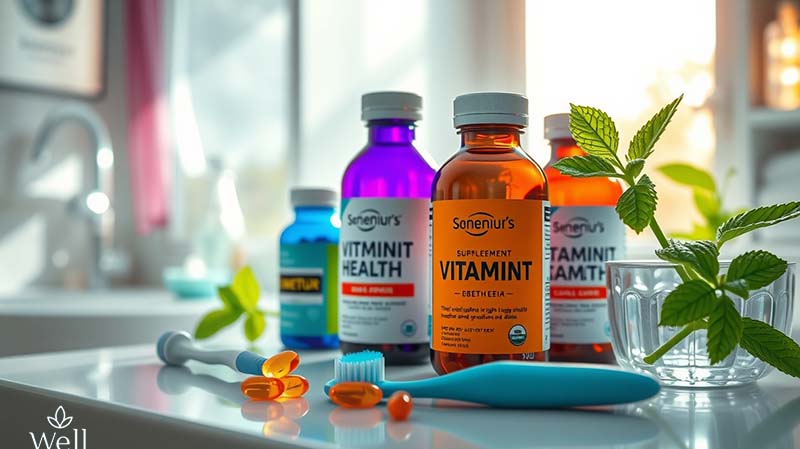As we age, maintaining oral health becomes increasingly important. For men and women over 45 living in the United States, the connection between diet and oral health is a crucial topic that is often surrounded by both facts and misunderstandings. This guide will explore the relationship between food and oral well-being, debunk common myths and emphasize the truth about nutritious eating for your teeth and gums.
The Importance of Oral Health in Older Adults
Oral health significantly affects overall health, particularly among older adults. Issues like gum disease, tooth loss, and oral cancer can arise or worsen with age, making it essential to prioritize dental care and healthy dietary choices. Additionally, oral health impacts essential functions such as eating, speaking, and social interactions.

Myth vs. Truth: What You Need to Know
When it comes to food and oral health, various myths can lead to confusion. It’s crucial to distinguish between facts and misconceptions.
Myth 1: Sugar is the Only Food that Causes Cavities
While it’s true that sugar plays a significant role in cavity formation, it is not the sole culprit. Bacteria in the mouth feed on sugars, producing acid that erodes tooth enamel. However, other factors contribute to cavity development, such as:
- Carbohydrates: Foods like bread, pasta, and crackers can also break down into sugars and lead to decay.
- Frequency of Snacking: Constant snacking without proper dental hygiene allows bacteria to thrive.
- Poor Oral Hygiene: Failing to brush and floss regularly can lead to plaque build-up, which promotes cavities.
Truth: Calcium-rich Foods Strengthen Teeth
Foods high in calcium, such as dairy products, leafy greens, and fortified plant-based alternatives, are essential for maintaining strong teeth and bones. Incorporating these into your diet can help prevent osteoporosis and support gum health.
Foods That Promote Oral Health
Several foods can significantly benefit oral health. Here are some of the best options for older adults:

1. Dairy Products
Milk, cheese, and yogurt are packed with calcium and phosphorous, vital for healthy teeth. They help neutralize acids produced by bacteria and enhance saliva production, which is essential for washing away food particles.
2. Leafy Greens
Vegetables like spinach, kale, and collard greens are not only high in calcium but also rich in vitamins A, C, and K, which support gum health and overall wellbeing.
3. Crunchy Fruits and Vegetables
Foods like apples, carrots, and celery act as natural toothbrushes, scrubbing teeth as you chew. They also stimulate saliva production, which can help prevent decay.
4. Nuts and Seeds
Nuts, like almonds and walnuts, and seeds, such as sunflower seeds, are excellent sources of healthy fats, protein, and essential minerals. They provide nutrients that support oral health and can be a great snack option.
5. Green Tea
Rich in antioxidants and polyphenols, green tea can inhibit the growth of bacteria that cause cavities and gum disease. Consuming green tea can also help reduce inflammation in the gums.
Foods to Limit for Better Oral Health
Just as some foods promote oral health, others can be detrimental. It’s essential to be mindful of your choices:
1. Sugary Foods and Drinks
The biggest offender for oral health is sugar-laden foods and beverages. Regular consumption of candy, soft drinks, and cakes can lead to an increase in acidity in the mouth and result in dental decay.
2. Acidic Foods
Citrus fruits, vinegar-based dressings, and sodas can erode enamel if consumed excessively. While they can be part of a balanced diet, moderation is key.
3. Sticky Foods
Foods that stick to teeth, like caramels and certain dried fruits, can linger and promote decay. It’s crucial to clean your teeth after consuming these items.
Hydration and Oral Health
Staying hydrated is equally important for oral health, especially for older adults who may experience dry mouth due to medications or natural aging. Dehydration can lead to difficulty swallowing, increased cavity risk, and oral discomfort. Here are some hydration tips:
- Drink plenty of water: Staying hydrated helps maintain saliva production, which is crucial for washing away debris and bacteria.
- Limit caffeinated beverages: While coffee and tea can be enjoyable in moderation, they may contribute to dry mouth.
- Add moisture-rich foods: Foods like watermelon, cucumbers, and soups can help keep you hydrated.
The Role of Oral Hygiene in Relation to Diet
While diet plays a significant role in maintaining oral health, it should be coupled with proper dental hygiene practices. Here are vital aspects to consider:
1. Regular Brushing and Flossing
Brushing teeth twice a day and flossing daily is crucial for preventing decay and gum disease. Using fluoride toothpaste can enhance the protective effects of brushing.
2. Routine Dental Check-ups
Visiting the dentist every six months is essential for maintaining oral health. Professional cleanings help remove built-up tartar, while regular check-ups can catch issues early.
3. Consider Fluoride Treatments
Your dentist may recommend fluoride treatments or varnishes, especially if you are at high risk for cavities. These treatments can strengthen enamel and help prevent decay.
Managing Dry Mouth: A Common Issue
Dry mouth, or xerostomia, is a common issue faced by many older adults, often exacerbated by medications or health conditions. Managing this condition is crucial for oral health. Here are some strategies:
- Stay hydrated: Drink water frequently throughout the day.
- Use saliva substitutes: Over-the-counter products can help keep the mouth moist.
- Chew sugar-free gum: This can stimulate saliva production and help cleanse the mouth.
Taking Supplements for Oral Health
Some older adults may consider supplements as part of their oral health regimen. While whole foods should be the primary source of nutrition, certain supplements may offer benefits:

1. Calcium and Vitamin D
Calcium is vital for bone health, while vitamin D helps the body absorb calcium. Supplements can be beneficial if dietary intake is inadequate.
2. Vitamin C
This vitamin is essential for gum health and can help prevent gum disease. Vitamin C supplements can be beneficial, especially for those not getting enough from their diet.
3. Probiotics
Emerging research indicates that probiotics may aid in balancing oral bacteria, helping to reduce the risk of cavities and gum disease. Consider discussing this with your healthcare provider before starting any new supplements.
Making Healthy Choices in Your Diet
Choosing the right foods and maintaining a balanced diet can greatly impact your oral health. Here are tips for making healthier dietary choices:
- Plan Your Meals: Incorporate a variety of foods from all food groups to ensure balanced nutrition.
- Read Labels: Be conscious of sugar and salt content in processed foods.
- Cook at Home When Possible: Preparing meals allows you to control ingredients and portion sizes.
- Experiment with New Recipes: Try to include new, healthy ingredients to keep meals exciting and nutritious.
Conclusion: Prioritize Oral Health
Understanding the relationship between food and oral health is essential for men and women over 45. By debunking myths, emphasizing truths, and making informed dietary choices, older adults can significantly enhance their oral wellbeing and overall health. Remember that maintaining a nutritious diet, coupled with proper oral hygiene and regular dental visits, lays the foundation for a healthy, confident smile throughout the years.
Benefits
Food for Oral Health: Truths and Myths for Older People
1. Nutrient-Rich Foods Support Oral Health
One of the primary benefits of a diet rich in nutrients is its positive impact on oral health. As we age, our bodies require different nutritional support to maintain not only our overall health but also the well-being of our teeth and gums. Consuming a variety of nutrient-dense foods can significantly improve oral health, especially for older adults. Here are some key nutrients and their benefits:
- Calcium: Essential for maintaining strong teeth and bones, calcium helps combat tooth decay and supports jaw health.
- Vitamin D: This vitamin aids in the absorption of calcium and plays a role in maintaining healthy gums and overall oral health.
- Vitamin C: Vital for gum health, vitamin C helps in the healing of wounds and combats gum diseases like gingivitis.
- Phosphorus: Works in conjunction with calcium to strengthen tooth enamel and maintain bone strength.
- Antioxidants: Foods rich in antioxidants can decrease inflammation in the gums, reducing the risk of periodontal diseases.
2. Hydration for Saliva Production
Staying hydrated is crucial, particularly for older adults who might experience a decrease in saliva production as a side effect of certain medications or medical conditions. Saliva plays a significant role in oral health because:
- Natural Defense: Saliva helps neutralize acids produced by bacteria in the mouth, reducing the risk of cavities and decay.
- Food Breakdown: It plays a critical role in the initial stages of digestion, making it easier to chew and swallow food.
- Oral Hygiene: Saliva helps wash away food particles and bacteria, contributing to a cleaner mouth.
Encouraging adequate water intake can combat dry mouth and enhance saliva production. Some hydrating food options include:
- Watermelon
- Cucumber
- Celery
- Broths and soups
3. Foods to Avoid for Better Oral Health
In addition to incorporating beneficial foods, it is equally important for older adults to be aware of foods that can negatively impact oral health. Certain foods may contribute to tooth decay, gum disease, and other oral health issues:
- Sugary Snacks: Foods high in sugar can lead to increased bacteria in the mouth, which produces acid that erodes tooth enamel.
- Acidic Foods: Consuming excessive acidic foods can wear down tooth enamel over time. Citrus fruits are healthy, but moderation is key.
- Starchy Foods: Foods like chips or bread can cause plaque buildup if not properly cleaned from the teeth.
- Alcohol: Alcohol can lead to dry mouth and oral health issues if consumed excessively.
- Tobacco Products: Smoking or chewing tobacco is detrimental to oral health, leading to dental issues and increasing cancer risk.
4. The Role of Probiotics in Oral Health
Probiotics are often recognized for their health benefits for the gut, but they also play a significant role in maintaining oral health. Incorporating probiotic-rich foods into the diet can provide several oral health benefits:
- Balance Oral Microbiome: Probiotics help maintain a healthy balance of bacteria in the mouth, potentially reducing the risk of conditions like bad breath and gum disease.
- Fight Infection: Certain strains of probiotics can inhibit the growth of harmful bacteria, promoting healthier gums and overall oral hygiene.
- Reduce Inflammation: Probiotics may help reduce inflammation in the gums, addressing issues related to periodontal disease.
Foods rich in probiotics include:
- Yogurt with live cultures
- Kefir
- Fermented vegetables like kimchi and sauerkraut
5. The Myth of All Sugar is Bad
While it is widely accepted that sugary foods can negatively impact oral health, there’s a myth that all sugars are equal in terms of harm. It’s important to distinguish between different types of sugars:
- Natural Sugars: Sugars present in fruits and dairy come with vitamins, minerals, and fiber that can offer protective benefits. For example, the fiber in fruits can help clean the teeth.
- Added Sugars: These are typically found in processed foods and beverages and are the main culprits of tooth decay.
- Moderation is Key: It’s not just about avoiding sugars entirely; understanding the context and the source is vital for making informed dietary choices.
This understanding is essential for older adults to balance their diets and enjoy the benefits of natural sugars without overindulging in harmful processed ones.
Related Links
FAQ – Questions and Answers
Why is oral health more important for people over 45?
As we age, risks such as gum disease, tooth loss, and oral cancer increase, making oral health essential for overall well-being.
Is sugar the only cause of cavities?
No, while sugar is a major factor, carbs like bread and poor oral hygiene also contribute to cavity formation.
Do calcium-rich foods help oral health?
Yes, foods like dairy and leafy greens strengthen teeth and bones, supporting both oral and general health.
How do dairy products benefit teeth?
Dairy provides calcium and phosphorous, helps neutralize acids, and stimulates saliva production.
Why are leafy greens good for your gums?
They’re packed with vitamins A, C, and K, which support gum health and reduce inflammation.
Can crunchy fruits and vegetables clean teeth?
Yes, foods like apples and carrots act like natural toothbrushes and stimulate saliva flow.
Are nuts and seeds good for oral health?
Yes, they’re rich in healthy fats, minerals, and protein, supporting strong teeth and gums.
Does green tea benefit oral hygiene?
Green tea contains antioxidants that reduce inflammation and inhibit bacteria that cause gum disease.
Which foods should be limited for better oral health?
Limit sugary snacks, acidic foods like sodas, and sticky foods that cling to teeth and cause decay.
Why are sticky foods bad for your teeth?
Sticky foods stay on teeth longer, feeding bacteria and increasing the risk of cavities.
What role does hydration play in oral health?
Drinking water promotes saliva production, which washes away food particles and neutralizes acids.
Which drinks can contribute to dry mouth?
Caffeinated beverages like coffee and tea may reduce saliva and contribute to dry mouth.
Can moisture-rich foods help prevent dry mouth?
Yes, foods like cucumbers, watermelon, and soups support hydration and ease dry mouth symptoms.
Is brushing and flossing still necessary with a healthy diet?
Absolutely. Good hygiene complements diet and prevents plaque buildup and gum disease.
How often should older adults visit the dentist?
At least every six months for cleanings, check-ups, and to catch issues early.
What are fluoride treatments and are they useful?
Fluoride treatments strengthen enamel and are especially helpful for those at risk of cavities.
What causes dry mouth in older adults?
Medications, aging, and certain health conditions can reduce saliva flow and lead to dry mouth.
How can you manage dry mouth effectively?
Drink water regularly, use saliva substitutes, and chew sugar-free gum to stimulate saliva.
Should older adults consider oral health supplements?
Yes, supplements like calcium, vitamin D, and probiotics can support oral and overall health.
How does vitamin C support oral health?
Vitamin C helps maintain healthy gums and reduces inflammation, aiding in gum disease prevention.
Do probiotics improve oral health?
Emerging research suggests probiotics may balance oral bacteria and reduce gum disease risk.
What are some natural sources of probiotics?
Yogurt with live cultures, kefir, and fermented vegetables like kimchi and sauerkraut.
Is all sugar equally bad for your teeth?
No. Natural sugars in fruits are less harmful than added sugars in processed foods.
Are acidic foods always bad for teeth?
Not necessarily. Citrus fruits offer benefits, but excessive consumption can erode enamel.
Why is moderation important in a healthy diet?
Moderation allows you to enjoy beneficial foods while minimizing risks like enamel erosion or decay.
How can meal planning support oral health?
Planning balanced meals helps ensure you get the nutrients needed for strong teeth and gums.
Why is cooking at home good for your teeth?
It lets you control ingredients, reduce sugar intake, and choose oral-friendly options.
How can reading labels help protect your teeth?
It helps you avoid hidden sugars and additives that can harm your teeth and gums.
Can oral health affect your ability to eat and socialize?
Yes, pain or missing teeth can impact speech, nutrition, and confidence in social situations.
How does a healthy mouth contribute to overall health?
Good oral health reduces the risk of infections, improves digestion, and supports heart and immune health.
Interesting Links
Social Media
Instagram: https://www.instagram.com/newofficialwellness/
Facebook: https://www.facebook.com/people/Well-Health-Guide
Youtube: https://www.youtube.com/officialwellness

